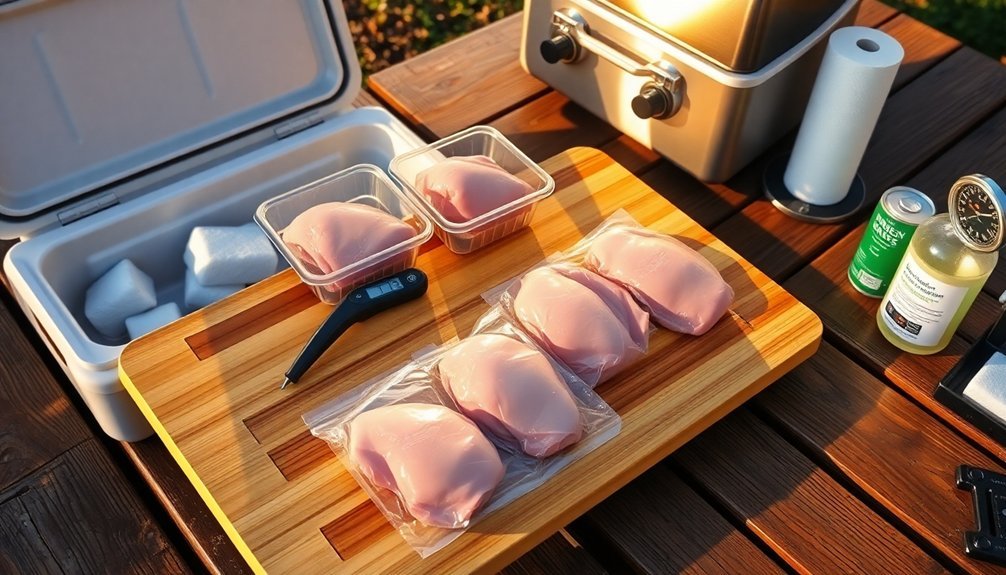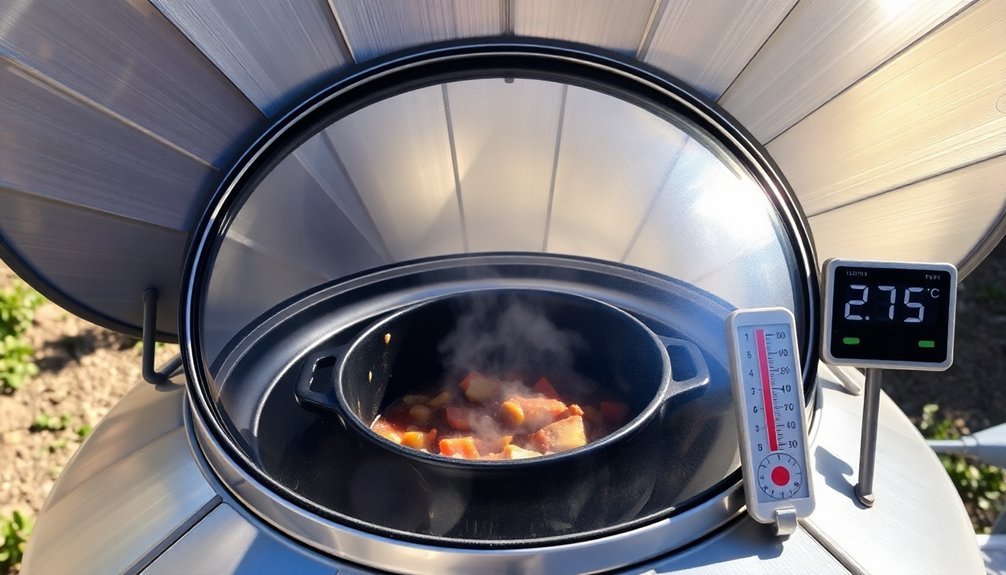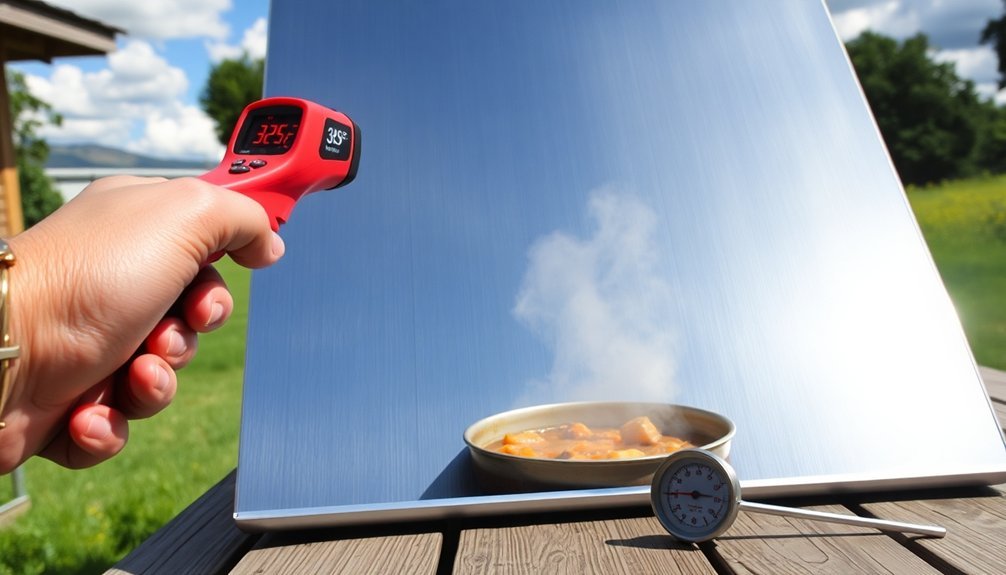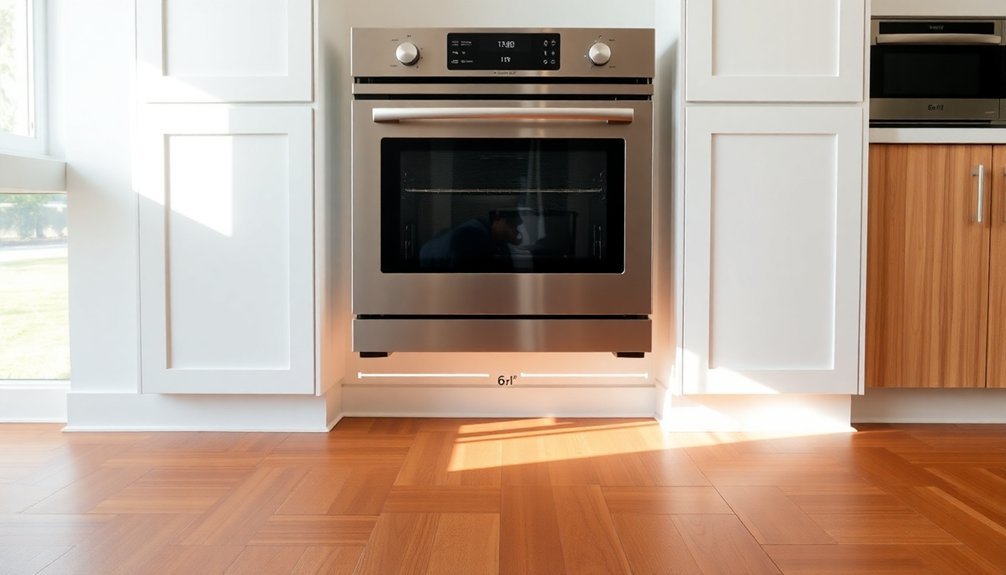When handling meat outdoors, you'll need to follow three essential rules to prevent foodborne illness. First, always keep raw and cooked meats completely separate, using different plates, utensils, and cutting boards to avoid cross-contamination. Second, maintain proper temperature control – keep raw meat below 40°F and guarantee it reaches safe cooking temperatures (160°F for ground meats, 165°F for poultry). Third, pack your meat smartly using proper containers and ice packs, and never let it sit out for more than one hour in hot weather. Following these fundamentals will keep your outdoor cooking adventures safe, but there's much more to mastering outdoor food safety.
Separate Raw From Cooked

When handling raw and cooked meats outdoors, proper separation is essential to prevent cross-contamination and foodborne illness.
You'll need two sets of plates – one for raw meat going to the grill and another for cooked food coming off it. Never place cooked meat on a plate that previously held raw meat unless you've thoroughly washed it with hot, soapy water. Using a clean grill brush before and after grilling helps remove harmful bacteria and food debris.
Keep separate utensils for raw and cooked foods, or wash them thoroughly between uses. Use different cutting boards for raw meat, poultry, seafood, and produce.
If you're using marinades, don't reuse ones that touched raw meat unless you boil them first. When basting, either use two brushes or clean your brush with hot, soapy water between applications.
Cover both raw and cooked foods to maintain safe temperatures and prevent cross-contamination.
Temperature Matters Most
Beyond separating raw and cooked meats, proper temperature control stands as your primary defense against foodborne illness in outdoor cooking.
You'll need to monitor temperatures vigilantly, especially since outdoor conditions can accelerate bacterial growth. Your ground meats must reach 160°F, while steaks and roasts need 145°F with a three-minute rest. All poultry requires 165°F for safe consumption.
Keep your raw foods below 40°F and your cooked foods above 140°F to stay outside the danger zone where bacteria multiply rapidly. Processing raw poultry at 55°F maximum temperature is acceptable, but you must chill it back to 40°F within two hours.
Don't leave food out for more than two hours at normal temperatures, or one hour when it's above 90°F. Use a clean, instant-read thermometer in the thickest part of the meat to check temperatures accurately.
In direct sunlight, you'll need to be even more careful with timing and temperature monitoring.
Pack Smart Stay Cool

Proper packing techniques make the difference between a successful meat transport and a spoiled harvest.
You'll need to center and secure your load tightly, using your pack's tie-down straps or additional rope in an X-pattern to prevent shifting.
Position flatter cuts against the pack and meatier portions on the outside. When securing quarters, keep the bones in for structural support, and place hindquarters with ball joints facing up for ideal cooling. Working with longer flexible knives helps achieve clean separation of meat when deboning is necessary.
Don't stuff meat inside game bags – instead, lay it on top to maximize airflow and allow the exterior to firm up.
If you're returning to camp, hang your meat in a shaded tree or lay it out where air can circulate.
For uneven loads, stack opposing quarters in different directions to maintain balance during your trek.
Frequently Asked Questions
How Long Can Marinated Meat Stay at Room Temperature Before Cooking?
You shouldn't leave marinated meat at room temperature for more than 2 hours. It'll be in the dangerous temperature zone where bacteria multiply quickly. For safety, always marinate your meat in the refrigerator.
What's the Best Way to Clean a Public Grill Before Use?
You'll want to scrub the grates with a wire brush, run the grill on high heat for a few minutes to burn off residue, then scrub again and oil the grates with a paper towel.
Can I Partially Pre-Cook Meat at Home Before Grilling Outdoors?
You can pre-cook meat before grilling, but you'll need to transfer it immediately to a hot grill to finish cooking. If there's any delay, refrigerate it promptly to prevent bacterial growth.
How Do I Properly Dispose of Raw Meat Packaging Outdoors?
Wear gloves, double-bag the packaging, and dispose of it immediately in an outdoor trash bin. You'll want to clean any surfaces it touched with hot soapy water and wash your hands thoroughly afterward.
Should I Oil the Grill Grates Before Cooking Meat?
Yes, you'll want to oil your grill grates before cooking meat. It prevents sticking, helps create perfect grill marks, and protects the grates. Use a high-smoke-point oil like canola or peanut oil.
In Summary
You'll stay safe and keep your outdoor dining enjoyable by following these three essential rules. Remember to maintain strict separation between raw and cooked meats, monitor temperatures carefully, and pack your coolers strategically. Don't let food safety slip just because you're outside – these simple steps will protect you and your guests while ensuring your outdoor meals are memorable for all the right reasons.





Leave a Reply